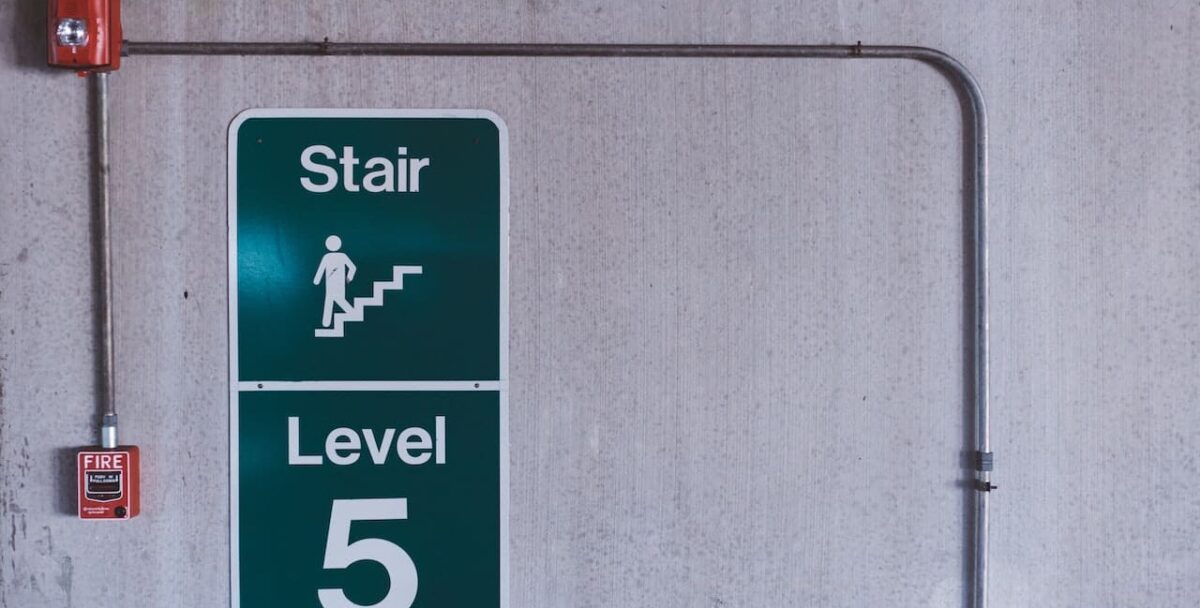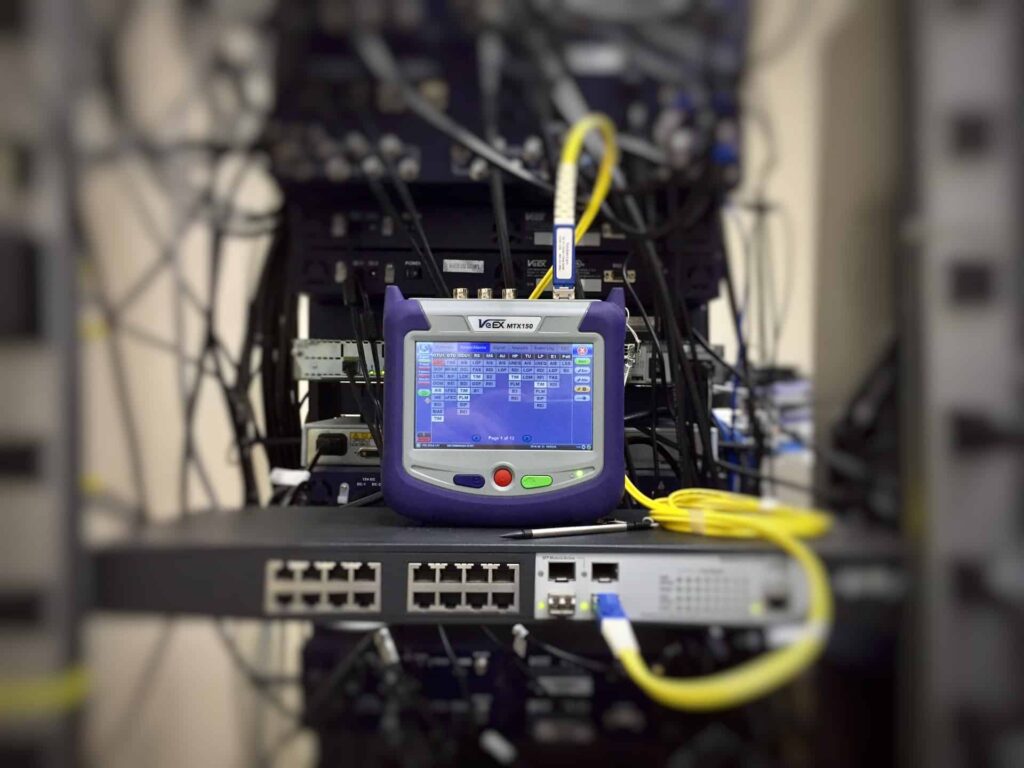A fire can cause significant damage, especially in a data center. All of that data and equipment could be lost. If you want to protect your data center, you need to have an adequate fire suppression plan, which can help prevent a fire from causing widespread problems. However, not all fire suppression plans are the same. Here is an overview of fire suppression systems and how you can implement one into your data center.
Do you manage a data center and want to find ways to keep it properly maintained? Fires can start for various reasons, including inadequately cleaned equipment. At C&C Technology, we offer power, cleaning, and other solutions to keep your data center in top shape!
What Is Data Center Fire Suppression?
A data center fire suppression system refers to various methods to stop a fire from spreading throughout your data center. Many of these fire suppression systems are designed to target certain data center sections, such as individual racks or rooms. Most fire suppression systems stop fires from engulfing the entire building. Unfortunately, if you cannot contain a fire, you could lose all of that valuable data. While most data is stored in the cloud, when a fire damages your hardware or other physical media, it can put a financial strain on your business.
If you are ready to invest in a data center fire suppression system, remember that all data centers have inherent fire risks. These fire risks can include damaged or failing cables, hardware, HVAC equipment, and wires. Even those raised floors and suspended ceilings can increase the chances of a fire occurring in your data center. Fire suppression systems are designed to stop the fire as soon as they start while protecting your data center equipment and your employees. While fire sprinklers and handheld extinguishers can help employees put out a fire or get out to a safe space when a fire occurs, these suppression systems can prevent any widespread damage.
Related: Data Center Cleaning Best Practices
Fire-rated firewalls and floor assemblies are known as passive fire protection, and they can slow the spread of the fire. A data center fire suppression system helps to keep your equipment safe. Yes, when a sprinkler goes off over your equipment, it will damage all those components. However, a data center fire suppression system can detect and stop the fire before the water-based equipment explodes in the room.
That data equipment is costly. The last thing you want to do is replace it due to water damage. Plus, the equipment contains all of your critical information. For that reason, you should think about these specialized fire suppression systems.
Data Center Risks
Data centers are well-oiled machines for the most part, but accidents can happen. While data centers operate with the best equipment and technology, data center fires can always occur. According to the Uptime Institute, there have been 25 data fires in recent history.
Unfortunately, there is a risk with every type of data center service, including Amazon Web Services, Google Drive, and iCloud. Most data centers use fire suppression systems to reduce the impact of the fire. You need to find a professional data center provider who can help you navigate through any of these disasters.
Many things can be the cause of a data centerfire. The raised floors, cables, wires, digital equipment, suspended ceilings, and HVAC equipment are often the culprits of these fires. Wires can become damaged and spark a fire. A buildup of debris and dust in the racks leaves your center vulnerable to fire. When the dust becomes heated, it can cause a fire in those spaces. Even poor repairs and maintenance are some factors that can lead to a devastating fire and costly damage.
While some of the causes of a data fire can be marked off as an accident, many more of these fires could have been prevented with the proper maintenance and cleaning of the data center.
Automatic Fire Suppression Systems Are Vital for Data Centers
These fire suppression systems are designed to detect any fires as soon as they start. Once detected, the system works to suppress it immediately. All fire suppression systems have one goal: to prevent the fire from spreading throughout the center and the rest of the facility. If there is heat or flames, the system will be alerted and work to suppress the fire.
The National Fire Protection Association classifies fires into five classes, including:
- Class A: fueled with combustible materials like wood or paper
- Class B: fueled with flammable liquids or flammable gasses
- Class C: involves electrical equipment
- Class D: uses ignitable metals for a fuel source
- Class K: uses cooking oil or fat as a fuel source
Most data centers use fire suppression systems that are rated for A, B, and C classes. Classes D and K are not commonly found in a data center.
Data Center Fire Suppression Systems
Take a look at several types of fire suppression systems for a data center. Many of these systems do vary from each other. They can fall into either the engineered fire suppression system or the pre-engineered fire suppression system categories. The critical part of all data center suppression systems is stopping the fire without damaging expensive equipment. The best data center fire suppression methods will not leave behind a messy residue to spray water into the room.
Those engineered fire suppression systems will flood the room with a “clean agent.” These agents are gaseous, using fire or electrically non-conducting extinguishants. The primary clean agents are halocarbons and fluorinated ketones. When these agents are distributed, they will not impact the oxygen in the room. They combine chemical and physical mechanisms to suppress a fire.
They will not leave any residue after evaporating when they fill the room. Clean agent fire suppression systems are designed to stop a fire before the flames or heat cause the sprinkler system to operate. After the clean agent has suppressed the fire, the building’s ventilation systems can quickly remove the agent from the room—these systems work without harming the data center equipment and the people working in the space. The clean agents are stored as a liquid but can quickly be released as gas.
Due to the lack of suppression residue, data centers don’t have to spend money on new equipment or clean up after the fire. If you are searching for an environmentally friendly option, think about inert gasses. Compared to halocarbon-based or fluorinated ketone clean agents, these gasses will suppress the fire by lowering the oxygen content in the data center. As the oxygen levels are reduced, the fire will not continue to burn. This method is greener than other types of systems since inert gasses do not contribute to ozone layer depletion.
A pre-engineered fire suppression system will not flood with a clean agent. These systems are designed to protect smaller spaces, such as electrical panels, engine compartments, and racks.
A water mist fire suppression system is designed for a data center. Many fire suppressions use water. For example, water sprinklers are often required in a building. While these sprinklers will protect the building in case of a fire, the water will damage your hardware and other equipment. Water effectively puts out a fire, but it is also destructive. Instead of dumping water on your hardware, water mist fire suppression systems are an alternative solution.
The water mist fire suppression system uses atomized water droplets that are less than 100 microns. Those tiny droplets allow the water to turn into steam. Since these water droplets are smaller than those from a water sprinkler, they will evaporate faster, resulting in less water needed to extinguish a fire in a data center. Yes, water is still used in the process. However, the water droplets used in the high-pressure water mist system evaporate at a greater speed, meaning it is less likely that the hardware, equipment, or other property will be damaged during the fire suppression stage.
Along with reducing the risk of water damage to the equipment, you can also lower water usage for the data center. These high-pressure water mist systems use less water than a traditional water sprinkler, resulting in lower water bills in the event of a fire. Plus, there are no high expenses due to cleanup after a fire incident in the data center.
Related: Data Center Cooling 101: From Start to Finish
Fire Detection Methods
Along with fire suppression systems, there are several methods for detecting fire. These methods include either a non-electric fire detection system or an active detection system. A non-electric fire detection system does not need electricity to detect a fire. Instead, fire detection tubes are installed in the building. As the tubes are introduced to a fire or heat, they will burst, releasing a clean agent down to suppress the fire.
The active detections work a little differently. This method controls and constantly monitors the data center for smoke or heat. When those elements are detected, the fire suppression system is triggered. However, this system does need power. If the power is out in the data center, the fire detection system goes down.
These fire detection methods and fire suppression systems can be beneficial for a data center. They all have the same goal: to stop the fire as soon as possible. The fire can be prevented from engulfing the whole building and putting lives in jeopardy.
All of that valuable equipment in a data center needs to be protected from fire. These methods will allow you to keep everyone and everyone safe inside these areas.
Now that you know the importance of data center fire suppression systems, you can choose the best practice for your needs. Fire suppression is essential for your data security. While there are many options on the market, you need to select a solution that maximizes the safety of the data center.
Data Center Fire Suppression Is an Essential System
Unfortunately, data center fires can happen in the blink of an eye. Often, these fires are the result of poor maintenance or faulty equipment. In other words, operators could have prevented them with the proper care and cleaning in the data center. Even with the best practices, there could still be an accident in the data center where equipment can catch on fire. In those situations, you want to make sure that you have a fire suppression system that will keep your employees and equipment safe from the fire.
There is no one-size-fits-all method for data center suppression systems. Fire suppression is vital to keep the fire from spreading and protect all of your necessary equipment. Over the past few decades, there has been a growing need for these systems. While you could rely on the traditional water sprinkler method, this will leave you with thousands of dollars in damages and prolonged downtime for your data center. The risk of fire is always there, but you can take steps to stop significant damage.
When it comes time to choose the right option, you need to work with the data management team to figure out what will work in your situation. These systems are critical to your data center operations. Whether you use water mist or gas in the fire suppression, you can reduce the damage from the fire. Most of these incidents are often accidental, but the fire suppression system can prevent the entire building from engulfing in flames. Along with that, it can help save the lives of your dedicated employees.
Are you looking for a way to keep your data center clean to prevent a fire? Take a look at our data center cleaning services from the experienced team at C&C Technology. Contact us to learn about what we can do for your data center!
Last Updated on January 21, 2023 by Josh Mahan


![Best data center racks Best data center racks [buyer’s guide]](https://cc-techgroup.com/wp-content/uploads/2021/08/best-data-center-racks-1024x576.jpg)

